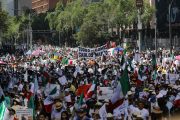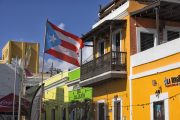Since arriving in Cuba on Saturday, Pope Francis has impressed mainstream media with benign messages of reconciliation, encouraging his listeners to overcome ideological preconceptions and embrace change. During his first speech after arriving on Saturday evening, he shocked the world by expressing “particular respect and consideration” for former Cuban dictator and avowed communist, Fidel Castro. On Sunday, he met with Castro for what the Vatican Press Office described as a “familiar and informal” conversation in which the two spoke about “protecting the environment and the great problems of the contemporary world.”
While some interpret Francis’ subtlety as an attempt to convert Castro, to promote the Catholic Church in Cuba, or to accelerate diplomatic appeasement with the United States, his lack of force and clarity leads others to ask, “Is Francis too soft on communism?” As one blogger put it:
In the light of Francis’ public words of esteem for Fidel in his first speech in Cuba, the most reasonable understanding that we can have of their meeting is that this was an expression of Francis’ deep sympathy for Fidel Castro and much of what he stands for. There is absolutely nothing in Francis’ speeches or homilies so far in Cuba to indicate that he wishes for the Church to more vigorously confront the iniquities of the current regime. Generic appeals for service and caring for others, or his declarations about “service that is not self-serving” or “service is never ideological,” can and will always be read in different and contradictory ways, not all of which will be uncomfortable to the Castros and their regime.
It’s a reasonable critique of the pope’s behavior, and certainly reasonable to expect more, considering the Catholic Church’s clear historical opposition to communism. In 1949, the Holy See excommunicated all Catholics involved in communist organizations, and though Catholics debate whether John Paul II’s 1983 Code of Canon Law revoked the excommunication, that pope judged communism to be a dangerous and “radical solution.”
In 1937, Pius XI called it a “satanic scourge” that “subverts the social order” and “denies the rights, dignity and liberty” of mankind. Nineteenth-century popes were just as strident in warning of the dangers of the then-budding movement. In 1878, Pope Leo XIII warned of the “deadly plague” of “poisonous doctrine” that strives for “the overthrow of all civil society whatsoever.” And in 1846, Pius IX denounced “the unspeakable doctrine of Communism, as it is called, a doctrine most opposed to the very natural law. For if this doctrine were accepted, the complete destruction of everyone’s laws, government, property and even of human society itself would follow.”
So what is the key to understanding Pope Francis’ current course? The answer may lie in his Argentinian roots. “During my teen years I made an incursion into left-leaning circles,” he told Javier Camara and Sebastian Pfaffen, authors of the book Quel Francesco (That Francis). Francis related his involvement with Peronists, though the pope stressed, “I never joined any party.” He said that the similarities he detected between “aspects of the Peronist doctrine and the Church’s social doctrine” helped lay his spiritual foundations.
“Peronist doctrine” refers to the political movement founded in Argentina by twice former President Juan Perón who first came to power in 1946 when the boy who would become Pope Francis was only 10 years old. Perónism has been described as neo-fascism, right-wing socialism, populism, and collectivism, while the United States policy of containment in the 1950s wisely regarded Perón as nothing more than a communist in sheep’s clothing. But whatever the movement’s designation, the size of Argentina’s government exploded under Perón’s authoritarian demagoguery and has never recovered. He instituted universal social security, free public education and medical care, and vast social welfare programs. He monopolized the newspapers and nationalized the country’s corporations and broadcast media sources. He was also not above the use of violence and political intimidation to achieve his goals.
This is the political environment in which Jorge Mario Bergoglio (a.k.a. Pope Francis) grew up, and which “to a certain extent, engendered spiritual solidity,” as he told Camara and Pfaffen. So Perónism may explain how Francis can deny accusations of Marxism while maintaining the appearance of it — such as denouncing capitalism, refusing to condemn communism, supporting radical UN so-called “sustainable development” goals, calling for world government, and engendering numerous leftist admirers.
Photo of Cristina Fernández de Kirchner, president of Argentina, with Pope Francis: casarosada.gob.ar





